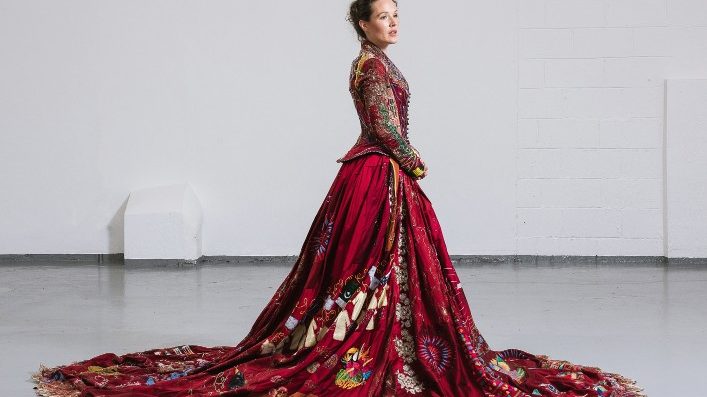There are very few things that connect civilisations like art. Whether it’s through musical compositions, images on canvas, timeless monuments, or stitched fabrics, creative expression offers us the means to share who we are, our places of origin, and what’s important to us. However, not often does one piece of imaginative creation succeed in representing the voices, values, and thoughts of people from all over the world. According to a recent article from Upworthy, the Red Dress project is one such amazing creation, where exquisiteness, storytelling, and connection are sewn together in every fibre of one elegant clothing.
A royal garment from everywhere
Ostensibly, the Red Dress looks like something appropriate for royals. But this is no regular stately dress. With its profound burgundy satin, elaborate needlework, and elegant form, it’s difficult to assign it to any culture or tradition. Rather, it draws from all over Europe, Africa, Asia, the Americas, and beyond—its design a seamless and synchronised blend of international influences.
Such universality was not achieved by chance. Consisting of 84 sheets of silk dupion brought from across the globe over 14 years, the Red Dress was worked on by as many as 380 individuals from across 51 nations. As they worked, personal tales and distinct idiosyncrasies were poured into the dress. What came out was a splendid apparel that goes beyond borders and expresses a language of grit, perseverance, memories, traditions, and beauty.
Stitching stories: The women behind the art
With each stitch of the Red Dress is a woman with a compelling story. Almost one-third of the embroiderers were skilled craftspeople, commissioned and paid for their work, and now have a percentage of the display fees. The others were unpaid assistants who participated in community cross-stitch events, who came from different walks of life. An astounding 97% of the contributors were women, and most of them were using the endeavour as a chance to express personal and cultural stories, some even discovering a path to economic solidity through their expertise.
Some sewed traditional designs that have been passed down for generations. Others knitted in intimate self-examination—recollections, symbols, or sentiments—that spoke to their inimitable journeys. One panel was embellished by two women in Kosovo, who shared firm musings about their wartime experiences. These intensely personal insights and inputs shifted the dress into more than just a piece of clothing; it became a universal bedding of reflexive accounts and embodied experiences.
From sketch to global symbol
The Red Dress was initiated as an unpretentious drawing by British textile artist Kirstie Macleod in 2009, illustrated on the back of a table linen. Then it swiftly transformed into something more glorious — a collective platform to explore individuality and breed connection among women from diverse cultural and geographic backgrounds.
Finalised and completed in 2023, the dress comprises millions of stitches, a visual and emotive record of collective human experiences. Today, it is being toured around museums and galleries all over the world, frequently exhibited by women of different backgrounds and ages, each one exemplifying a piece of the women’s shared narrative.

